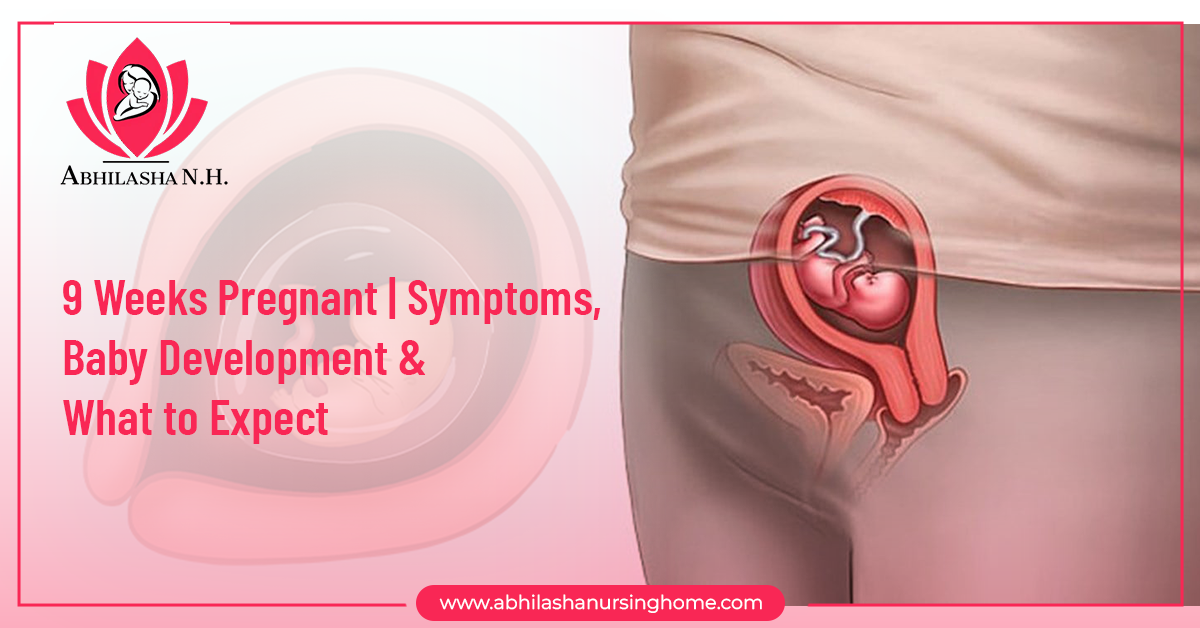9 Weeks Pregnant: Pregnancy at 9 weeks marks a crucial stage in fetal development. Your baby is now officially a fetus, and significant changes are happening in both your body and the growing baby. This article is part of our Fetal Development Stages of Pregnancy, covering essential details, symptoms, and care tips for this phase.
Baby Development at 9 Weeks Pregnant
At 9 weeks, your baby has grown to about 2.3-3 cm in length (CRL – Crown-Rump Length) and weighs around 2 grams. The major organs are developing rapidly, and the baby’s tiny fingers, toes, and facial features are becoming more defined. The heart is beating at an average rate of 140-170 beats per minute.
Key Development Highlights:
Baby’s Size: Comparable to a cherry.
Ultrasound Insights: You may see tiny limb movements.
Heartbeat: Can be detected via ultrasound.
Organs Formation: The liver, spleen, and intestines continue developing.
Genital Development: External genitalia start forming but are not yet distinguishable via ultrasound.
Common Symptoms at 9 Weeks Pregnant
Pregnancy symptoms vary from person to person, but some common experiences at this stage include:
Morning Sickness & Nausea: You may still experience vomiting, which can intensify for some women.
Extreme Fatigue: Increased progesterone levels can make you feel more tired than usual.
Breast Tenderness: Your breasts continue to grow and become sensitive.
Frequent Urination: Due to increased blood flow and kidney activity.
Mood Swings: Hormonal fluctuations may cause emotional ups and downs.
Headaches & Dizziness: A result of blood pressure changes.
Bloating & Gas: Progesterone slows digestion, causing bloating and gas buildup.
Mild Cramping & Abdominal Pain: Mild cramps are normal, but severe pain should be checked by a doctor.
Is It Normal to Have No Symptoms at 9 Weeks Pregnant?
Some women may feel completely normal at 9 weeks with minimal or no symptoms. This is generally not a cause for concern, but if you have concerns about your pregnancy, consult your healthcare provider for reassurance.
9 Weeks Pregnant Belly and Weight Gain
Belly Size: Some women notice a small bump due to bloating, while others may not show yet.
Weight Gain: Expect to gain around 0.5-2 kg by this stage, but it varies from person to person.
9 Weeks Pregnancy and Bleeding: When to Worry
Some women experience light spotting or brown discharge, which may be normal. However, red bleeding, cramping, or clot-like tissue discharge should be immediately reported to your doctor, as it may indicate miscarriage risks.
Circumstances that indicate a High-Risk Pregnancy:
Experiencing heavy bleeding accompanied by severe cramps can be a cause for concern, especially if there is a history of previous miscarriages. Additionally, underlying health conditions such as diabetes, hypertension, or thyroid issues may further increase the risk of complications. It is essential to seek medical attention promptly to ensure proper care and management. For detailed information read our guide on Circumstances that indicate a High-risk pregnancy.
Prenatal Care at 9 Weeks Pregnancy
Routine Prenatal Tests for Ensuring a Healthy Pregnancy include:
- Blood tests to check HCG levels, hemoglobin, and Rh factor.
- Ultrasound to confirm fetal heartbeat and growth.
- Screening for Urinary Tract Infection in Pregnancy.
- Checking thyroid and glucose levels.
9 Weeks Pregnancy Diet: What to Eat & Avoid
A well-balanced diet is crucial for fetal development. Below is a vegetarian 9 Weeks Pregnancy Food Chart:
| Food Category | Recommended Foods |
| Proteins | Lentils, chickpeas, tofu, paneer, soybeans |
| Carbs | Whole grains, brown rice, oats, quinoa |
| Fruits | Apples, bananas, oranges, avocados, pomegranates |
| Vegetables | Spinach, carrots, broccoli, bell peppers |
| Dairy | Milk, yogurt, cheese |
| Healthy Fats | Nuts, seeds, olive oil |
Foods to Avoid:
- Unpasteurized dairy
- Raw or undercooked eggs
- Excessive caffeine
- High-mercury fish (if consuming non-veg diet)
For more details read our guide about “Supplement for Healthy Pregnancy“
Exercise and Lifestyle at 9 Weeks Pregnancy
Impact of Exercise on Maternal Mental Health During Pregnancy: Light exercises such as prenatal yoga, walking, and stretching can help improve mood and circulation.
Methods to Prepare for Natural Birth: Kegel exercises and pelvic strengthening techniques.
Ways to Prepare Your Body for a Smooth Normal Delivery: Balanced nutrition, hydration, and controlled weight gain.
Preventive Measures During Early Pregnancy to Reduce the Risk of Miscarriage: Avoid alcohol, smoking, and high-stress environments.
9 Weeks Pregnancy and Skin Changes
Pregnancy hormones can cause skin changes including pigmentation, acne, or dryness. Using mild, pregnancy-safe skincare products can help manage these changes.
When to Contact a Doctor
- Severe abdominal pain or cramping
- Heavy bleeding or clots
- High fever or chills
- Sudden loss of pregnancy symptoms
- Persistent vomiting leading to dehydration
Note: Dr. Abhilasha Prakash (MBBS, DGO, MS) is a leading gynecologist at Abhilasha Nursing Home with over 32+ years of experience. She specializes in gynecology, obstetrics, and infertility, providing expert care and guidance for expecting mothers.
Final Thoughts
At 9 weeks pregnant, your baby is rapidly developing, and your body is adjusting to the growing fetus. Proper prenatal care, a healthy diet, and regular check-ups will help ensure a smooth pregnancy journey.
Don’t forget to check out our upcoming guide on 10 Weeks Pregnant Symptoms & Baby Development to stay informed about your pregnancy journey!
Also You can read our Guide for:

